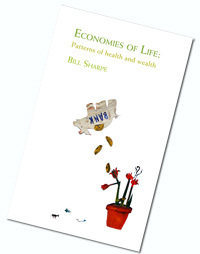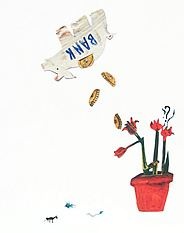Ecological Thinking
Bill Sharpe didn't coin the term 'ecological thinking', which gets used in a multitude of ways. But he has developed much of the thinking around the idea and introduced us to the very helpful distinction between it and economic thinking. The following is an extract from an essay of his which, in turn, comes from his book Economies of Life (see below). "Ecological thinking sees the properties and behaviours of parts as determined by the pattern of the whole. Rather than look at an individual species, we look at the interactions of all the organisms, and how they are maintained by, and themselves maintain, the overall flows of resources. Thus the trees on a mountainside themselves play a part in the formation of the clouds and rainfall that maintain them and that contribute to the viability of other species around them. Lose the trees and the cycle of rain is lost, the heat of the sun dries the ground, and the whole ecosystem moves to a much lower level of fecundity. Economic thinking is particularly concerned with issues of resources and how they are allocated. Consideration of such issues lies naturally within an ecological framework. However, in our common parlance, ‘the economy’ has come to refer to the pattern of activity that is supported by our use of money, and we generally have money in mind when we refer to ‘economic value’. From this habit of language and thought much confusion arises that this set of essays is trying to clear up. We will be developing the idea of an economy in later essays, but for now, in order to introduce the discussion, we’ll stay with the conventional sense of ‘an economy’ to mean what goes on when we take things to market and trade them for money. In the case of natural resources it is very clear that the ecosystem ‘works’ without the need for any money to circulate; it is the input of energy from the sun, and the flow of resources such as water through rainfall, and other material exchanges that sustain it. When an ecosystem interacts with the economy then an additional dynamic is set up. If you want to log a forest for timber sustainably then you must understand the ecosystem that maintains its viability, or you will be in danger of taking too much from it, and tipping it into decline. What is this economic dynamic – what happens when an ecosystem becomes entwined with economic activity? At the simplest level, some components of the ecosystem become detached from their role in the system, in which they and the system maintain each other through their mutual and original properties, and get put to some ‘other’ use which bears no systemic relationship to the health or viability of the original system. I cut down a tree and take it away to make furniture. Two things happened here: the tree came down, and it was removed. The first would happen naturally at some point, but its removal inevitably changes the ecosystem. The pattern of resource circulation that was a part of the system that produced the tree has been disturbed. The cutting down might also matter because the seeds might not yet have been produced; or they might need fire to germinate, and felling may change the undergrowth such that the conditions for fire and germination are lost, etc. The basic point is that ecosystems do not exist ‘for’ any purpose – they just are what they are, and they develop along certain paths based on the conditions they are in. Once we start to connect them with economies, in which parts of them are ‘for something’ that lies outside the ecosystem, then we perturb them, and thereby we become instrumental in their continued viability. We create a mutual dependence between our own needs and the needs of the ecosystem. If we need it for something, to make furniture or whatever, then it also needs us to ensure that our perturbations don’t destroy its essential system properties. At the most basic level our responsibility is to ensure we do not draw own too much resource at once, and that we allow the system time to ‘recover’; in other words, we rely on some self-maintaining, homeostatic process to put back the things we are removing, or remove the things we are dumping." References: Bill Sharpe: Homo Ecologicus and Homo Economicus (The essay) Economies of Life (The book) |
Explore |



